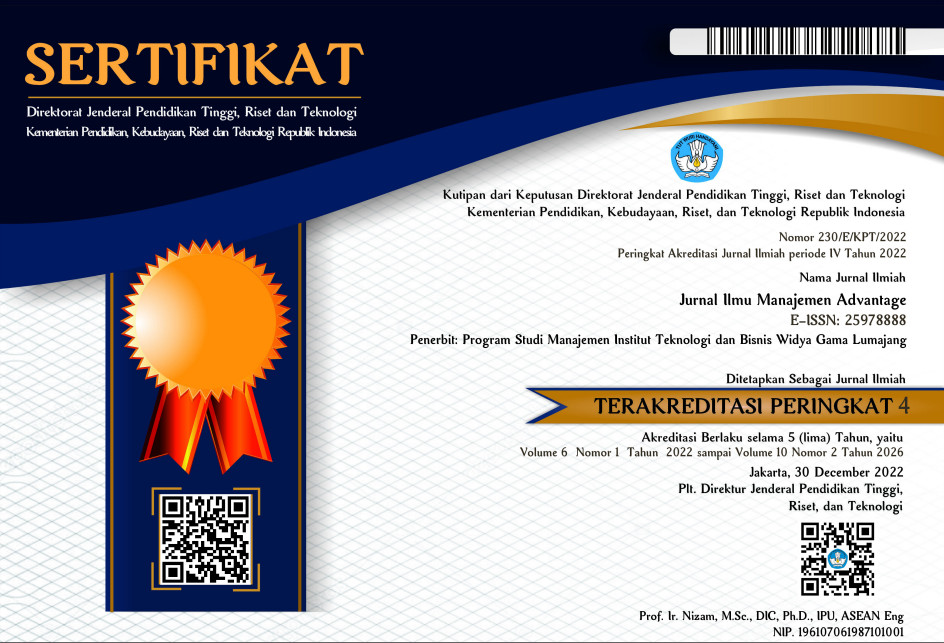The Relationship between FOMO and Work Motivation with Employee Performance in Gen Z
DOI:
https://doi.org/10.30741/adv.v7i2.1208Keywords:
FOMO, Gen Z, Motivation, PerformanceAbstract
The purpose of this research is to see the relationship between FOMO and motivation and employee performance in Gen Z. This research uses quantitative methods by collecting data using questionnaires in Gen Z with purposive sampling techniques. The research data obtained was analyzed using multiple regression analysis. Based on the results of the F test, F= 5.156 with p= 0.007 (p<0.05) means there is a significant relationship between FOMO and motivation and performance. These findings indicate that the hypothesis which states that there is a relationship between FOMO and motivation and employee performance in Gen Z is accepted/proven. The results of the partial analysis show that between FOMO and performance, t= -0.211 with Sig. 0.008 (p<0.05) means that there is a significant negative relationship between FOMO and proven performance, meaning that the higher the FOMO in Gen Z, the more their performance will decrease and so does on the contrary. The relationship between motivation and performance was obtained t= 0.175 with Sig.0.018 (0<0.05) meaning there is a significant positive relationship between motivation and performance, the higher the motivation, the higher the performance of Gen Z employees and conversely the lower the motivation of Gen Z, the higher the performance decrease.
Downloads
References
Akbar, R. S., Aulya, A., Apsari, A., & Sofia, L. (2018). Fear of Missing the Moment (FoMo) in Samarinda City Teenagers. Psychostudia: Journal of Psychology, 7(2), 38-47.
Anoraga, P. (2009). Work Psychology. Jakarta: Rineka Cipta.
Azwar S. 2013. Human Attitudes: Theory and Measurement. Yogyakarta: Student Library.
Chotpitayasunondh, V., & K. M. Douglas. 2016. How “Phubbing” Becomes The Norm: The Antecedents and Consequences of Snubbing Via Smartphone. Journal of Computers in Human Behavior. UK: University of Kent (Vol. 63 No. 09)
Damayanti, Fitria. 2015 The Influence of the Work Environment on Work Morale Through Work Discipline. Investment journal, Faculty of Economics, Unwir Vol.1, No. 1: 36-53.
Dossey L. (2013). FOMO, digital dementia, and our dangerous experiments. Explore: The Journal of Science and Healing, 10(2):69-73.
Furnham, A., Eracleous, A., & Premuzic, T. C. (2009). Personality, motivation and job statistics: Hertzberg meets the Big Five. Journal of Managerial Psychology, 24(8), 765-779. Downloaded from http://dx.doi.org/10.1108/0268394091099678
Henry Simamora. 2014. Human Resources Management. Jakarta: Developing Literacy.
Jood, T. Ella. (2017). Missing the present for the unknown : the relationship between fear of missing out (FoMO) and life satisfaction. Dissertation. Clinical Psychology University of South Africa.
Latief, Baharuddin. August 2012. Factors that Influence PT Employee Performance. Mega Mulia Servindo in Makasar. Journal of Management and Accounting, 2(1), 61-70.
Mahardika. (2013). RUFA New Assessment. https://www.scribd.com/doc/154394539/pengkajian-baru-RUFA.
M. Manullang. 1981. Basics of Management. Jakarta: Ghalia Indonesia.
Morris, N., & Jaclyn D. Cravens Pickens. (2017). “I'm not a gadget”: A grounded theory on unplugging. American Journal of Family Therapy, 264–282.
Nasrudin. (2010). Management Psychology. Bandung: CV. Faithful Library.
Przybylski, A. K., Muryama, K., Dehaan, C. R., & Gladwell, V. (2013). Motivational, Emotional, and Behavioral Correlates of Fear of Missing Out. Elsevier: Computers in Human Behavior, 29, 1841-1848. http://dx.doi.org/10.1016/j.chb.2013.02.014.
Sedarmayanti. (2011). Human Resources Management, Bureaucratic Reform in Civil Servant Management. Bandung: Rafika Aditama
Singh, A. P., & Dangmei, J. (2016). Understanding the Generation Z: The Future Workforce. South-Asian Journal of Multidisciplinary Studies, 3, 1-5.
Song, X., Zhang, X., Zhao, Y., & Song, S. (2017). Fearing of Missing Out (FoMO) in Mobile Social Media Environment: Conceptual Development and Measurement Scale. In iConference 2017 Proceedings (pp. 733–738).
Stillman, D. & Stillman, J. (2018). Generation Z: Understanding the Character of a New Generation that will Change the World of Work. Jakarta: PT. Gramedia Pustaka Utama.
Suci, R.P and Idrus, M.S. (2015). The Influence of Employee Training and Work Discipline on Employee Performance PT. Merpati Nusantara Airlines (Persero). Canadian Center of Science and Education. Vol. 7 No. 11. http://dx.doi.org/10.5539/res.v7n11p7, 21 March 2016.
Utami, P.D., Aviani, Y. I. (2021). The Relationship Between Self-Regulation and Fear of Missing Out (FOMO) in Adolescent Instagram Users. Tambusai Education Journal, 5(1), 177185.
Varela, L. (2021). Social Media Multitasking, Academic Performance, and the Fear of Missing Out. Retrieved from https://scholarworks.waldenu.edu/cgi/viewcontent.cgi?article=9729&context=dissertations.
Downloads
Published
How to Cite
Issue
Section
License
Copyright (c) 2023 Novy Fitria

This work is licensed under a Creative Commons Attribution-NonCommercial 4.0 International License.









